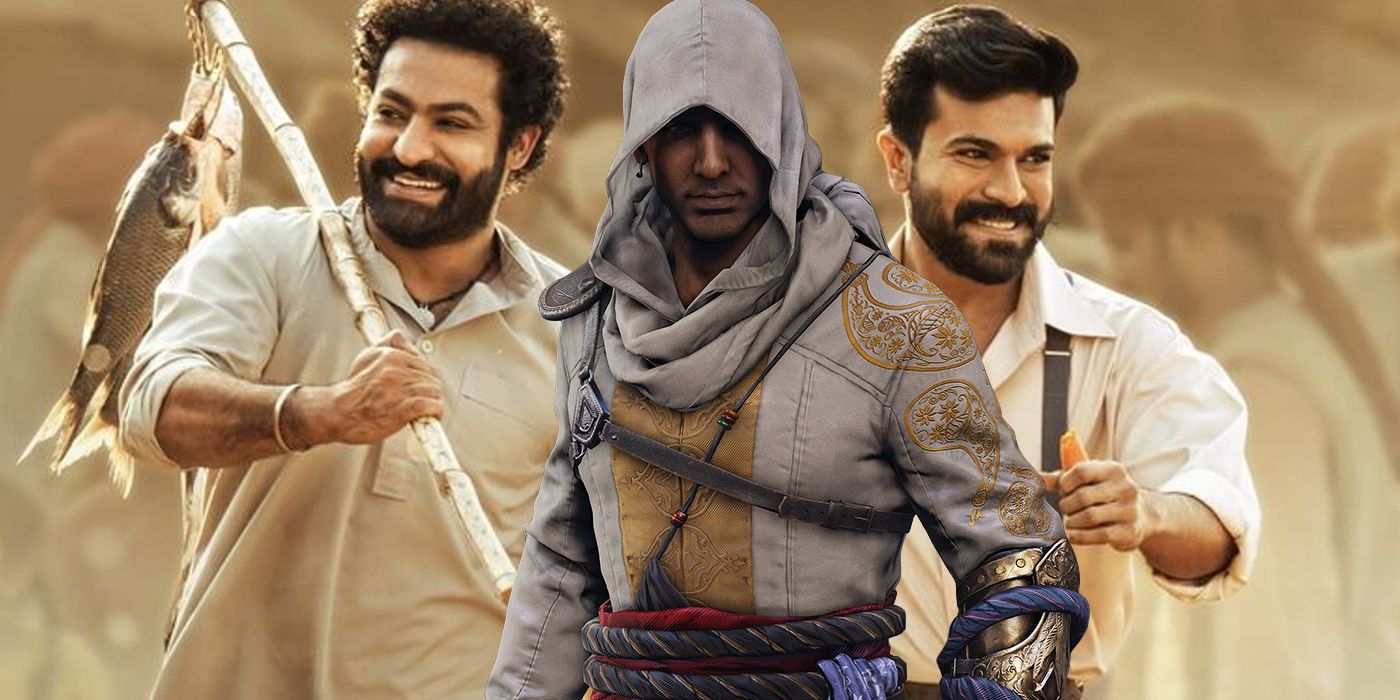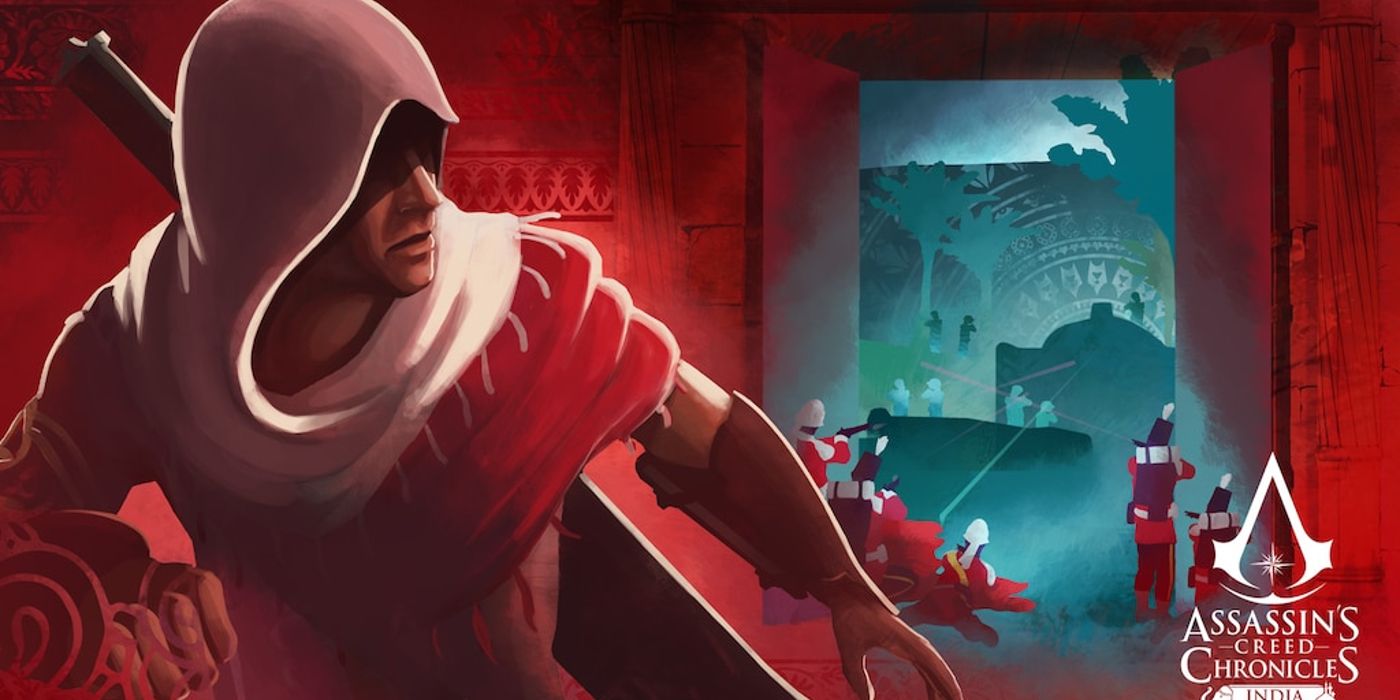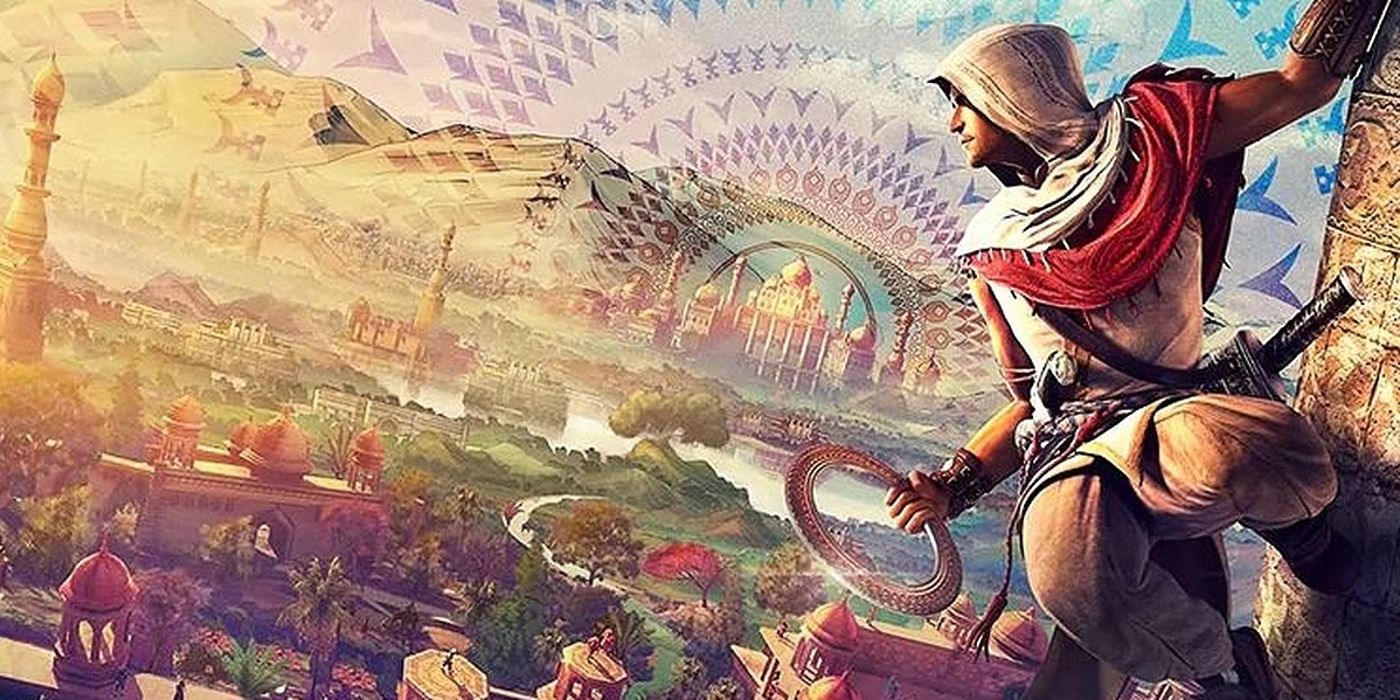Ubisoft's next Assassin's Creed game should take a leaf out of RRR's book - or rather a frame from its film - and be set in India. Much of the buzz about Assassin's Creed Infinity is focused on its rumored Japan-based setting, which would fulfill the long-held dreams of fans by enabling them to play as ninjas and samurai. However, RRR's ridiculous action sequences and compelling story highlight how ripe India's history is for another Assassin's Creed game.
RRR is a Tollywood film that takes place during the British Raj, a time period lasting from 1858 to 1947 during which the British Crown ruled over the Indian subcontinent. The story follows Bheem - a young Indian man on a mission to save a girl abducted from his tribe by a British administrator - and Raju, a fellow young Indian in the Indian Imperial Police hired by the British administrator's wife to stop Bheem. The two coincidentally form a friendship through a heroic act and end up teaming together to save the young girl.
The overarching conflict between the British Empire and the Indian people and the more specific dilemma between two friends with different views of the imperial force in their country set the perfect tone and plot for a new Assassin's Creed game. There is not only room for the war between the Assassin's Creed and Knights Templar to blossom, but there is also space for betrayal, secrecy, and espionage due to some Indian people enrolling into the imperial police force. And though the Assassin's Creed series has delved into Indian history with Assassin's Creed Chronicles, RRR shows that it is time to give an India-based Assassin's Creed title the AAA experience it deserves.
Assassin's Creed India Game - Why It Needs To Happen
Placing an Assassin's Creed game in India around 1920 like in RRR creates a setting teeming with revolutionary fervor. The independence movement really started to take off in the Indian subcontinent during this time, meaning the game and its plot would likely centralize itself around Indian independence. This is reminiscent of how revolutionary Paris was portrayed in Assassin's Creed Unity. Although the Assassin's Creed series may want to distance itself from the technological failings of that title, its setting was exciting and beautiful and opened the opportunity for a story of freedom that this hypothetical game could capitalize on.
If India was burning with revolutionary fervor in the 1920s, it was also a melting pot of cultures. India hosted a humongous population and a wide of array of cultures, religious beliefs, and languages; in fact, the India of 1920 had over 250 million people, and the country now has at least 22 official languages and an estimated 121 languages in total. This would enable an Assassin's Creed game based in India to have a large variety of city and village locations. Urban centers would be more jam-packed than almost any other setting in the Assassin's Creed series, and they would include people from all walks of life. Conversely, remote villages would host specific cultures that are distinct from what would be found elsewhere in the game.
India is not just a melting pot of cultures, however: it is a melting pot of ecosystems. The British Raj controlled more than just present-day India, and held power over the entire subcontinent which stretched hundreds of miles. This means that not only would the deserts and tropical areas of India make it into the game, but so would mountainous regions like the Himalayas (which would weirdly connect this Assassin's Creed to another Ubisoft title, Far Cry 4) as well as temperate forests and highlands. Along with these diverse biomes would come a wide variety of wildlife that would include Indian elephants, tigers, and snow leopards (which could hopefully be integrated into the game in a reference to RRR's legendary animal crate scene). This could prompt the series to bring back a hunting-based mechanic similar to the one seen in Assassin's Creed 3, which would fit perfectly into some of the nature-oriented religions and cultures in India.
Indian Assassin's Creed Game Would Has The Perfect Setup For The Assassin-Templar Conflict
The revolutionary fervor of India at the beginning of the 20th century also sets the stage for a conflict between the Assassin's Brotherhood and the Knights Templar. In previous games, the Knights Templar have been represented through imperial forces, including the British Empire in the Connor Kenway-fronted Assassin's Creed 3, so an Indian Assassin's Creed could continue in this tradition. This perfectly fits the mold of the Knights Templar as well, because the group's goal to establish an autocratic world order would be reflected by the Empire's actions.
In contrast, the Assassin Brotherhood would support the liberation movement. Plot-wise, this could start with India being recognized as its own nation in 1920 - the same year RRR takes place - when becoming a founding member of the League of Nations, a position the country gained itself through the sacrifice 1.4 million Indian troops made in the First World War. Notably, in the following year, Mahatma Gandhi would assume his rule in the Indian Congress and join a crew of politicians who sought Indian independence from the inside. This could set up a relationship between the Assassin's Creed game's main character and Gandhi that is reminiscent to Ezio and Leonardo da Vinci, one of the many historical figures in Assassin's Creed 2. Additionally, Gandhi's initial goal of liberating India from within the government could provide a semi-peaceful portion to the beginning of the game's story. During this period, the main character could slowly become initiated into the Brotherhood in a way that again mirrors Ezio's character progression in Assassin's Creed 2. This approach to the story would be a welcome and refreshing callback for the series, as it would place an emphasis on character in the same way the Ezio trilogy did.
Of course, the main character would eventually need to proceed with their regular assassin activities. This point could be when Gandhi began using peaceful protests as his means to fight against the British Raj. Gandhi's abandonment of straightforward politics could be mirrored in the main character joining the Assassins, from which point they would use covert, violent means to fight against the Templars.
Though Assassin's Creed Chronicles: India has already brought fans of the series to the subcontinent, RRR shows just how much a true AAA game experience could bring to the table. India's diverse culture and environment combined with revolutionary and anti-colonial themes lend themselves well to the series, and the opportunity to bring back a story-driven, character-centric style should be taken. With rumored plans to include more than one setting in Assassin's Creed Infinity, here's hoping that India is on the list.



